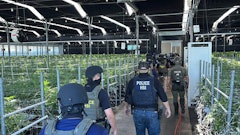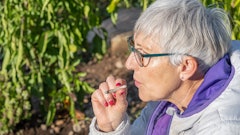
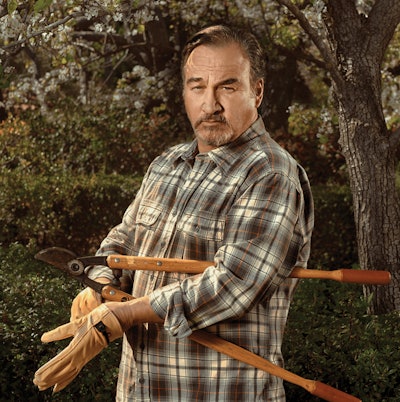
Jim Belushi says the tragic death of his brother John (the actor, comedian and musician known for his roles on sketch comedy show “Saturday Night Live,” “National Lampoon’s Animal House” and the cult classic film “The Blues Brothers”) in 1982 ripped a hole in his family, leaving trauma and pain. “Addiction enters a family like a snake and starts to squeeze until somebody dies,” he says. “It collapses families.”
A famed actor, comedian and musician in his own right, Belushi spent years wrestling with John’s death, searching for meaning and purpose to it. It wasn’t until 2016, when he began cultivating cannabis on a farm he had acquired in Eagle Point, Ore., that he started to find answers to his questions. He’s not sure why cannabis cultivation appealed to him, but he’s adamant that he’s a changed person for it.
“Why am I doing this? I don’t know. I kind of stumbled into it, but it’s leading me to an understanding of my own brother’s death, the trouble that it caused in my family, the collapse of my family,” Belushi says. “And ever since I’ve been working with this cannabis, I’ve come a long way in healing all of that.”
With that newfound perspective, Belushi feels a responsibility to use his celebrity status to build a business that might help other individuals and families process their traumas. Thus, Belushi’s Farm was born.
‘Boots-on-the-Ground Guy’
Belushi has spent the past three years as a cannabis cultivator, fully engrossing himself in the subject and attending conferences to learn from and connect with other farmers. Speaking with him feels more like an interview with a determined agrarian rather than the Midwestern slacker he played on TV. It’s important to him that others in the Oregon market also understand that he is not who people see on the screen.
“I’m a boots-on-the-ground guy,” he says.
Unlike the investor approach many other celebrity cannabis business owners take, Belushi very much involves himself in the day-to-day operations of his business. For example, he shares, “I’m testing the temperature of the soil and making sure it’s 64 degrees in order for the micronutrients to absorb into the roots better.”
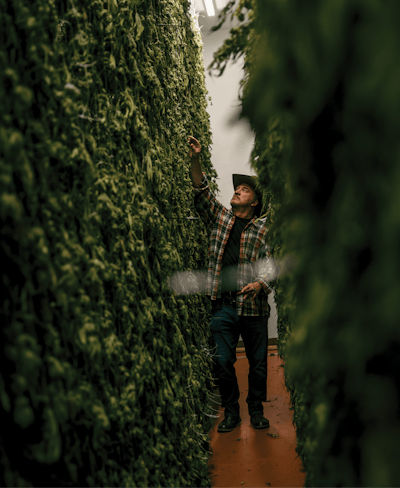
When you have celebrity status … you have the ability to throw a boulder into the pond and make a big wave. That’s a responsibility, and you’ve got to step up to it.”
The cannabis operation includes seven tunnel-style, poly film-covered greenhouses. Along with outdoor cultivation areas, the canopy totals 20,000 square feet. (The property is licensed for up to 40,000 square feet, but half is currently cultivated.) The actor-turned-farmer hasn’t used his funds to supercharge his operations, either, as he has kept the operation fairly bare bones. For example, until 2019, Belushi and his team removed light-deprivation curtains by hand. The owner used what little profit was made that year—and he stresses he was near breakeven—to add automated curtains to the tunnel structures.
The main project for the coming season is converting one of those open-ended structures into a greenhouse that will include “wet walls, fans, heaters, humidifiers, [and supplemental] lights, as opposed to just complete indoor light,” Belushi says. This will allow Belushi’s Farm to increase the number of harvests it can achieve in a year.
The company uses a base soil mix for both outdoor- and greenhouse-grown plants: equal parts pumice, mulch and perlite. Belushi’s Farm amends this mix with organic nutrients such as fish emulsion, langbeinite, and more. This lighter mix allows for increased drainage from the root zone, he says. Each plant sits in its own box, with the base of each container filled with 5 inches of gravel, another measure to increase drainage.
Belushi remains a constant student of cannabis horticulture: He and his team regularly conduct A/B testing on different nutrients and substrates. “This year I’m testing out a new soil called ‘Rocket Fuel,’” he says. With all kinds of new products on the market, he says, it’s important to always be aware of and test what seems interesting.
Belushi also pays special attention to the drying and curing stage. Curing, he describes, “is just like a magic act, and it’s really tense because if you don’t cure it right, it doesn’t matter what you put in the soil.”
Staying true to his musical passion, Belushi plays records for his “girls” (the plants). “I play Al Green, Marvin Gaye, Teddy Pendergrass just for a few hours in the day, especially when they’re vegging,” he says. “Then in the afternoons, I play a little reggae, a little blues depending on the strain. [For example,] Stardawg, I play a little bit more of funk.
“And then, when I harvest or the week before I harvest, I play gospel music for them because I want them to see the light, and I want to send them off into the world with some white lights of gospel music.”
Matching Genetics
Belushi isn’t just a “boots-on-the-ground guy” on the farm. “I’ve gone into every [Oregon] dispensary that [my products are] in ... most of them twice,” he says. “One [reason] is to establish a relationship with them and let them know I want to learn, I’m here to help and that this is real to me. It’s not just about the money.”
The second reason Belushi likes to visit partner dispensaries is to have face time with patients and consumers, to see and learn how his products change and resonate with them. Those interactions change him as much as his products help those patients and customers, he says.
“My paradigm shift in cannabis came from those dispensary visits where I met hundreds of customers,” he explains. He recounts the countless interactions with veterans dealing with nerve damage telling him how much cannabis helps manage their symptoms. He shares the story of a woman who shattered 23 bones in her body after a nasty car accident, got addicted to opioids, but is now using cannabis to manage her pain.
But one interaction stands out to the Belushi’s Farm founder. While visiting a dispensary, a man standing in line caught Belushi’s attention because he was staring at the cultivator so intensely. Belushi approached him, and the man began sharing his story.
“‘I was a medic in Iraq. And I saw things that happen in the human body that nobody should ever witness,’” Belushi recalls the man telling him. “‘I can’t talk to my wife. I can’t relate to my children, and I can’t sleep.’” The veteran said that Belushi’s Black Diamond OG strain is the only thing that helps him with all those symptoms. “I said, ‘Man, I didn’t make this,’” the farmer remembers. “And he goes, ‘No, but you’re the steward.’ That was the day I changed. … This isn’t about how I can compete with these other guys, this other brand, and make more money. This is really changing people’s lives.”
Seeing the different effects that various genetics have on different symptoms reinforced in Belushi the notion that a varied genetic library is key in helping as many people as possible—and for his business to find success. “My short-term goal is to get great healing products in a dispensary by cultivating strains that have a good balance of THC, CBD and terpenes,” he says.
“The wellness of cannabis not only helps with [post-traumatic stress disorder], seizures, anxiety, sleep disorders, Alzheimer’s, headaches, backaches; it also enhances, it stimulates creativity. It enhances the taste of food; it enhances the touch of your lover’s skin. It also brings a euphoria, a sense of joy and generosity and empathy—all that is involved in the wellness of cannabis.”
Belushi partnered with Captain Jack, the storied breeder who would hang backstage at “Saturday Night Live” (SNL) and offer his Gulzar Afghanica variety to the show’s cast and writers. Captain Jack’s prized genetic would colloquially become known as the “smell of SNL.” Today, Belushi works with him and Jeffrey Iverson, another breeder, to grow Gulzar and other genetics from seed, as well as create new lineages.
Like many cultivators, however, Belushi laments the fact that most patients and customers first go for products with the highest THC content. His dispensary visits, he says, constantly show him the education gap that exists in consumers about cannabinoids, terpenes and the “entourage effect.” Talking with those patients and customers, “I’m like, ‘that 18%, 19% THC [variety], give it a shot because that one has almost 4% terpenes, and there is an entourage effect you’re going to really like with no paranoia, no anxiety.’”
Belushi pairs Captain Jack’s genetics, which retails as a premium product line, with his Good, Ugly Weed brand, which is targeted toward people who are simply looking for “a product that works—and works well.” This decision sprung from his dispensary visits, when he noticed that consumers and patients would most often gravitate toward the higher- and lower-end products. “They either come in and go, ‘I want to buy the best,’ or they say, ‘I want to buy what works.’”
He adds, “the stuff in the middle doesn’t sell as well.”
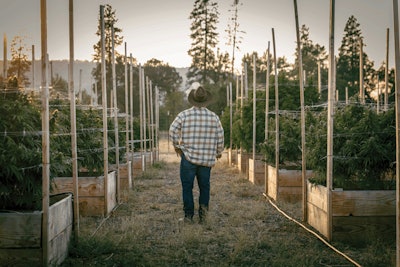
Everybody Has to Do Something to Help
Helping people in his community is at the center of nearly every decision Belushi makes about the farm, regardless of whether that decision becomes a profit driver for the company. For example, Belushi is working with both state and Portland officials on an opioid replacement program that would allow patients being treated with opioids to exchange their prescriptions for medical cannabis, allowing them to pay whatever they want or can.
There are many hurdles to clear before getting this project off the ground, he says, and abuses are bound to happen. But even in those cases, Belushi is hopeful that those in need might find some better healing than what they’re receiving from their existing treatment. “My thinking is … maybe that guy who’s suffering from being a veteran that’s on the street, that’s strung out psychologically, physically, emotionally, maybe he goes, ‘I can’t believe he’s giving this shit away for free, man. What a fool.’ But maybe if he starts using cannabis, it might bring him to a higher consciousness and he would get real help.
“It might slow down his drinking. He may really want to get help. He may call a cousin that he hasn’t talked to in seven years. I just think that this program can get people started, get them engaged with the plant and see where the plant takes them. I want to make it available, and it is a self-sustaining non-profit model.”
Belushi is trying to launch the program in Portland, but he hopes to one day bring the model to other major hubs that have been hit by the drug and opioid crisis.
Belushi also developed this program in part to honor his late brother, John. Both Jim and fellow actor Dan Aykroyd have gone on the record to say, “If John was a pothead, he’d be alive today.” Shielding or limiting others’ exposure to the damage his family endured when his brother died is part of the responsibility he feels an urge to fulfill.
His philanthropic efforts aren’t just targeted to major cities: Belushi is working hard to make a positive impact on the cities and towns near his operation, as well. In Medford, a roughly 20-minute drive from his farm, he is helping to reconstruct the historic Holly Theater to bring the 1930s Spanish Colonial movie palace back to life as Southern Oregon’s largest indoor concert venue. In Eagle Point, Belushi is assisting with the reconstruction of The Butte Creek Mill, destroyed in a 2016 electrical fire, to preserve its heritage, build up the community and improve the environment.
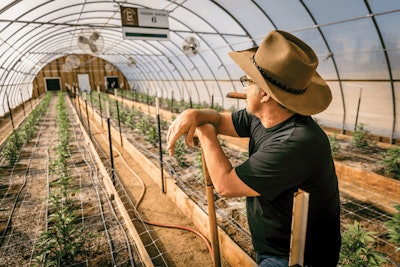
While sharing the initiatives he’s involved with, Belushi remembers the words of an old friend, who once told him, “Everybody in the community has to do something to help their community.”
Celebrity Awakening
Belushi intends to turn a profit on his business—what good business owner doesn’t? But as long as he can continue to pay his employees well enough that they can cover their mortgages, car and insurance payments while taking care of their families, Belushi does not appear to be overly concerned with the margins he makes.
That’s because, in his experience, when you follow your passions, money appears from behind. “I just did the acting thing in high school and college because it was fun. It fully engaged me,” he says. “I was learning about myself, and I got to meet girls. Then, all of a sudden, I get a job, and that was fun. I didn’t get paid shit, but I learned so much, and I was fully engaged. Then, all of a sudden, I’m on ‘Saturday Night Live’ ... I was just following what was fun, and the money always came.
“And this cannabis is doing the same thing for me. I am just so engaged; I’m so interested. … And you know what? The money will come.”
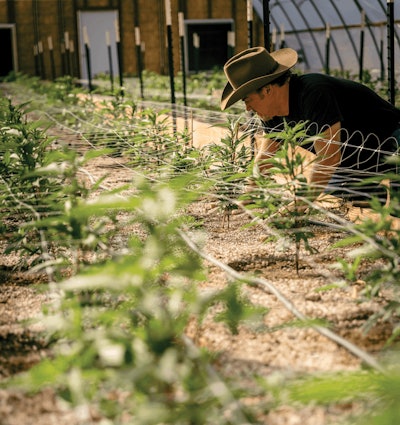
My paradigm shift in cannabis came from those dispensary visits where I met hundreds of customers.”
Belushi understands that he’s in a privileged position in being able to operate this way—not every cannabis cultivator has a successful career as an actor and musician. He also understands the responsibility that celebrities engaged in the cannabis industry should serve the larger cannabis industry, not just their own interests. Looking at the landscape, he’s happy to see more and more of his peers join the industry in earnest.
“I think it’s great that Willie’s out there, Snoop and Chong and … athletes, I just think it’s great,” he says. “There’s room for everybody’s point of view, and the end result is that we’re raising all the consciousness of the beauty of this plant.
“We all try to throw a pebble into the pond to make a ripple,” he muses, reflecting on the impact individuals can have in their various circles. “When you have celebrity status, you bring focus to the pond, and you have the ability to throw a boulder into the pond and make a big wave. That’s a responsibility, and you’ve got to step up to it.”
Belushi says that if he can bring to the world the peace and healing that cannabis gave him from the legacy of his brother’s troubled story, then he can rest assured that when the time came, he stepped up. And that’s worth more to him than whatever profits he can hope to earn.












